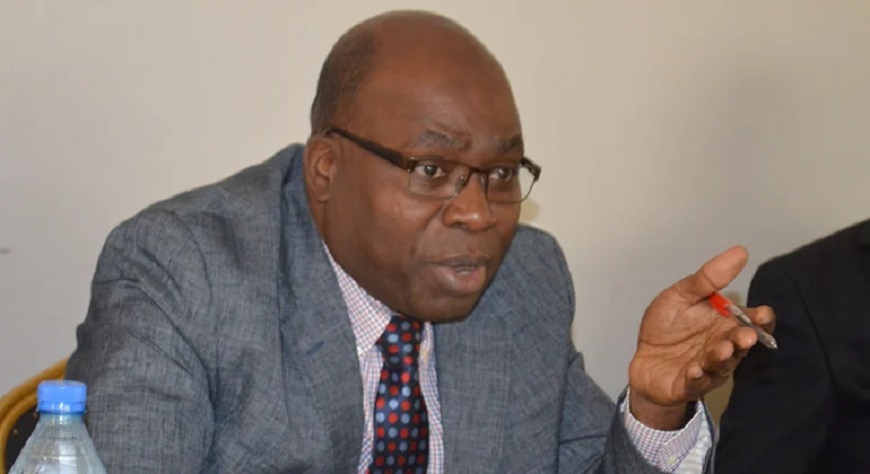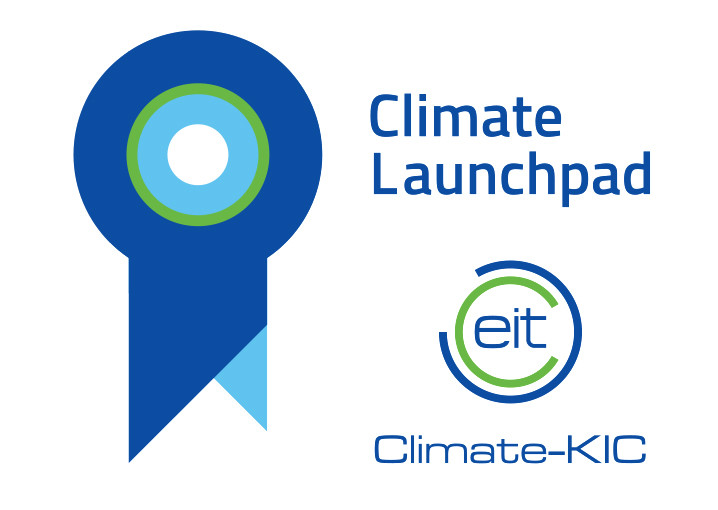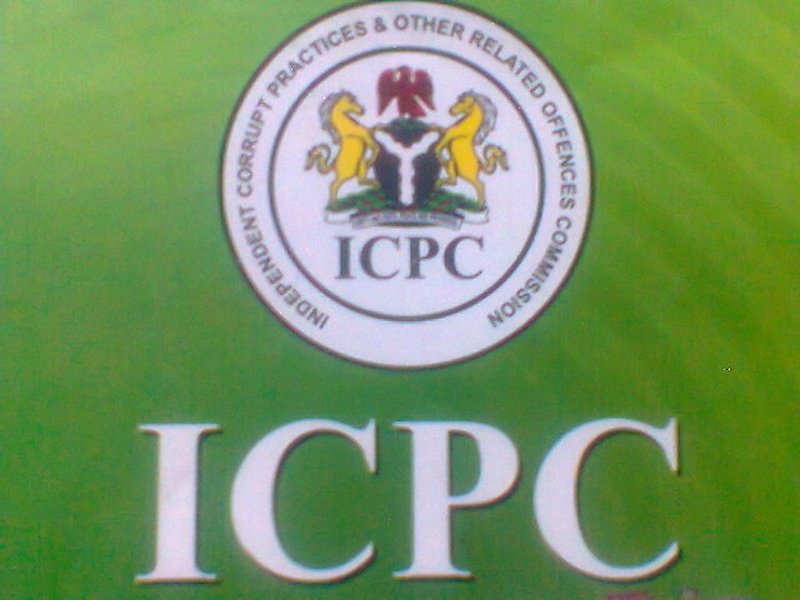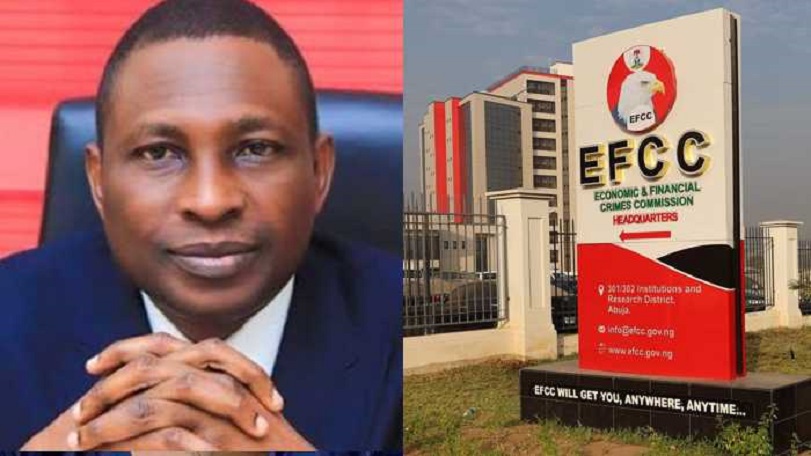General
Curbing Illicit Financial Flows Needs Global Framework—Owasanoye

By Adedapo Adesanya
The Chairman of Nigeria’s Independent Corrupt Practices and Other Related Offences Commission (ICPC), Mr Bolaji Owasanoye, has rallied a global action against Illicit Financial Flows (IFFs), including a call for a global framework on IFFs similar to corruption.
Mr Owasanoye made this call at a side event of the ongoing hybrid 54th Conference of the United Nations Economic Commission for Africa (UNECA) taking place in Dakar, Senegal.
According to a statement issued by the ICPC’s spokesperson, Mrs Azuka Ogugua, the conference would focus on regional efforts to track, recover and return stolen assets from Africa through the IFFs.
She said that the meeting was attended by representatives of member countries of the Economic Community for Africa, heads of anti-corruption agencies and international bodies.
Addressing the meeting virtually, the ICPC boss emphasised the need for a global framework on IFFs as part of a determined commitment to tackle the menace.
“The challenge we found ourselves today is that the rules have always been skewed in favour of those who export capital and against those who import capital. Corruption is a global issue and we have a global framework for corruption.
“The IFFs is also a global issue but does not have a global framework.
“A way out of the problem is to institute a global framework on IFFs which, among others, will address the huge financial losses suffered by African countries,” the ICPC chairman stated.
He noted that the COVID-19 pandemic and the Russia-Ukraine war had complicated the financial resources of African countries, hence the need to tackle the IFFs and stop the further haemorrhage of the financial resources on the continent.
Further to the global framework on IFFs, Owasanoye also proffered legal and policy measures that should be implemented by African countries to address the IFFs risk.
These legal and policy measures, according to the ICPC boss include a review of agreements entered into with Multinational Corporations (MNCs), a review of inimical double taxation agreements.
Others are the enactment of laws, rules or regulations on unexplained wealth orders or lifestyle audits, introduction of civil forfeiture of assets and beneficial ownership standards; and design of a framework for trans-digital transactions.
The ICPC chairman also advocated tougher measures against corrupt state officials who collude with the MNCs against their countries.
“African countries must understand that the MNCs split contracts.
“The juicy parts of the contracts with MNCs are domiciled in their home countries while the non-juicy parts of the contracts are domiciled in Africa.
“We need to deal with the MNCs’ collaboration by government officials who look the other way in international agreements,” he said.
In her remarks, the Secretary-General of the United Nations Conference on Trade and Development (UNCTAD), Mrs Rebecca Grynspan, said the global economy was under enormous stress due to the COVID-19 pandemic, Russia–Ukraine war, and climate change.
She noted that IFFs posed a huge challenge to African countries in realising the Sustainable Development Goals (SDGs).
“We are aware of the increasing rates which make it more difficult and harder for African countries to access finance.
“The African economies are also feeling the impact of the Russia – Ukraine war and thereby widening the financing gap.
“Africa requires US$2.45 trillion to meet its SDG financing gap. We can close half of the SDG financing gap for Africa if we are able to curb IFFs.
“We, therefore, cannot continue to allow the billions of dollars of IFFs slipping out of Africa every year,” she said.
She added that “The IFFs and Asset Recovery are more critical to Africa today. Both are required by African Countries to achieve the SDGs.”
She emphasised the need for data and collaboration among African institutions like Customs and Central Banks as a necessary condition for tracking the IFFs.
General
Court Acquits Abba Kyari of 23-Count Asset Declaration Charge

By Adedapo Adesanya
Justice James Omotosho of the Federal High Court in Abuja has discharged and acquitted the suspended Deputy Commissioner of Police Abba Kyari of a 23-count charge of alleged non-declaration of assets filed against him by the National Drug Law Enforcement Agency (NDLEA).
Mr Kyari is being charged alongside his two brothers, who were accused of swearing to false affidavits to conceal the origin of some properties.
The court in its judgment held that the NDLEA failed to provide sufficient evidence to prove its case against the defendants, which is mostly the non-declaration of land properties.
Justice Omotosho noted that proving ownership of landed properties can be done through traditional history, title, acts of possession and possession by connection.
The prosecution did not provide any of these documents to show that the said properties located in Fountain Estate, Kasana, which belong to Ramatu Kyari, are truly owned by the police officer.
Also, the court held that the prosecution did not provide the same material evidence linking Mr Kyari to properties in Linda Choko Road, Asokoro and also Maiduguri in Borno State.
Mr Kyari, in his defense said the properties in Borno belonged to his father, which he left for him and his siblings.
It was judged that the prosecution did not prove otherwise, adding that the prosecution charged Mr Kyari’s brothers in bad faith for alleged conspiracy, which they failed to prove.
General
NCC Arraigns Netnaija’s Emma Analike Over Alleged Copyright Infringement

By Modupe Gbadeyanka
The chief executive of Netnaija Media Enterprises, Mr Emmanuel Analike, has been arraigned before a Federal High Court sitting in Abuja by the Nigerian Copyright Commission (NCC).
The suspect appeared before Justice Suleiman Liman on Wednesday over allegations bordering on copyright infringement.
He was accused by the NCC of using his online platform to make movies and others not belonging to him available for users to download on the internet.
According to the agency, Mr Analike has infringed copies of audio-visual materials distributed online via his website for online users. Netnaija is an online movie and music download site.
The prosecution counsel, Ms Gladys Isaac-Ojo, who works with the NCC, told the court that the defendant committed an offence contrary to and punishable under Section 44 (1) (a) of the Copyright Act, 2022.
However, Mr Analike pleaded not guilty to the charges preferred against him, prompting his counsel, Nnemeka Ejiofor, seek his bail.
The lawyer informed the court that the application was filed on Monday and supported by 23 paragraphs of affidavits and a written address.
But the judge refused to give a bench ruling and adjourned the ruling of the bail application to Monday, March 9, 2026, ordering the remand of the Netnaija chief in Kuje Correctional Centre.
General
Entries Open for ClimateLaunchpad Green Business Ideas Competition

By Modupe Gbadeyanka
Entries for the 2026 edition of the world’s largest green business ideas competition, ClimateLaunchpad, have opened.
In 2025, the programme, organised by Climate KIC, received over 2,700 applications from 40 countries. The winning ventures gain prize money, investor connections, and access to a global cleantech network.
This year’s edition is expected to be bigger and better, with climate innovators, green venture builders, and entrepreneurs from around the world given the opportunity to apply.
Since its inception in 2014, the programme has supported nearly 5,000 ideas across 97 countries, and this year, it is expanding its presence in Asia with Singapore hosting both the regional final and global grand final for the first time.
Participants move through several stages, including an initial mini-course to refine the concept, an intensive multi-day Boot Camp led by expert trainers, targeted coaching to perfect value propositions and investor pitches, national and regional finals, and a place at the global grand final, with prizes and access to a global climate network.
“Strengthening ClimateLaunchpad’s presence in Asia marks a profound new chapter for this programme and for the climate innovation movement more broadly. Asia is where so much of the world’s climate and nature future will be shaped, through business leadership, public-private partnerships and long-term strategic thinking,” the chief executive of Climate KIC, Kirsten Dunlop, stated.
“We look forward to supporting this momentum with new business ideas and innovation ecosystem collaborations across more than a dozen countries.
“This expansion opens space for deeper cross-cultural connections and for first-time founders to turn sparks of imagination into solutions that serve both people and planet,” Dunlop added.
Also commenting, the chief executive of Better Earth Ventures, Ms Rebecca Sharpe, said, “We are proud to host ClimateLaunchpad’s regional and global grand final in Singapore and to convene an international group of climate entrepreneurs from more than 50 countries.
“Climate solutions are emerging from every corner of the world, and bringing them together creates the kind of cross-border exchange and collaboration this moment demands. Our focus is to ensure early-stage founders have the structure, ecosystem access and support needed to move from idea to credible impact.”
-

 Feature/OPED6 years ago
Feature/OPED6 years agoDavos was Different this year
-
Travel/Tourism10 years ago
Lagos Seals Western Lodge Hotel In Ikorodu
-

 Showbiz3 years ago
Showbiz3 years agoEstranged Lover Releases Videos of Empress Njamah Bathing
-

 Banking8 years ago
Banking8 years agoSort Codes of GTBank Branches in Nigeria
-

 Economy3 years ago
Economy3 years agoSubsidy Removal: CNG at N130 Per Litre Cheaper Than Petrol—IPMAN
-

 Banking3 years ago
Banking3 years agoSort Codes of UBA Branches in Nigeria
-

 Banking3 years ago
Banking3 years agoFirst Bank Announces Planned Downtime
-

 Sports3 years ago
Sports3 years agoHighest Paid Nigerian Footballer – How Much Do Nigerian Footballers Earn

















